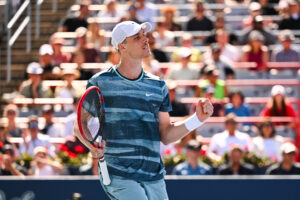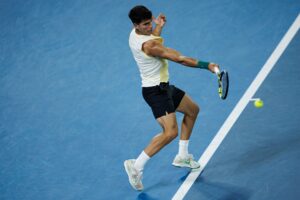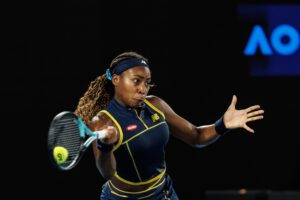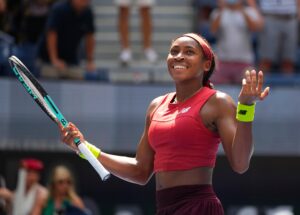Many of the men’s game’s greatest champions have lifted the title at Wimbledon, with the honour board at the All England Club unsurprisingly a who’s who of tennis greatness. But there have also been some very fine players who never managed to get over the line at Wimbledon. Here’s a look at some of the best men not to have won the title in SW19:
The Best Men Never To Win Wimbledon
Ivan Lendl
Ivan Lendl is the most high profile player to appear on this list. By 1990, the desire to win Wimbledon became an obsession for Lendl. In fact, Lendl would skip the French Open that year to spend more time practicing on grass, even installing a grass-court on his estate.
Ultimately, this did Lendl no real good as he never won Wimbledon. However, he does have a stellar record including two finals and seven semifinal appearances. Lendl lost semifinals to John McEnroe in 1984, Boris Becker in 1989, and Stefan Edberg in 1990. He lost the 1986 final to Becker in four sets and surprisingly to Pat Cash in 1987 in straight sets. Lendl won Queens in 1989 and 1990, which was some reward for his efforts on grass but not the prize he wanted most of all.
Away from Wimbledon, Lendl won three French Opens, three US Opens and two Australian Opens. Lendl played in 19 major finals and won 8 of them. Lendl also spent 270 weeks at world #1, which makes the top five list of all time players. It is worth noting Lendl lost the Australian Open final in 1983 on grass to Mats Wilander. Lendl won his two Australian Opens when the surface was switched to rebound ace in 1998, triumphing in 1989 and 1990.
Lendl’s biggest mistake and achievement (if that is possible) was to change his game to serve-and-volley on grass, on both serves no less. Andre Agassi showed in 1992 that it was possible to win Wimbledon staying back exclusively. Lleyton Hewitt won Wimbledon in 2002 hardly coming to net at all.
It is commendable Lendl changed strategy and came so close. Ultimately it is hard to escape the conclusion that Lendl simply played in the wrong era. With Lendl’s aggressive baseline style, his game would have been more suited for Wimbledon twenty years later in the 2000s.
Pat Rafter
A serve and volley specialist, Pat Rafter blossomed at Wimbledon in his late 20s, which coincided with the latter stages of his career. Before 1999, Rafter’s game suited hardcourts better. His “backhand body” kick serve literally jumped head height, where one and two handers struggled to cope with. However on grass, Rafter’s serve was not as effective, hence the relatively poor results. That changed in 1999 when he made his first semifinal, losing to Andre Agassi in straight sets, although it was competitive. The courts that year were considered hard, taking a lot of spin and kick.
Rafter gained semifinal revenge on Agassi in 2000 and 2001 in memorable five set battles. He lost the 2000 final to Pete Sampras and the 2001 final to Goran Ivanisevic, both in emotional circumstances. Rafter didn’t stick around and retired in 2002, when on paper it looked like he would have had a great shot to win Wimbledon if he had played. There is nothing to suggest that Rafter was not capable of winning Wimbledon. Rafter had great reflexes, athleticism plus a great competitive spirit. Rafter also made the most of his ability but a chronic shoulder condition cut his career short.
The one area where Rafter was behind other top attacking players was on return of serve and passing shots. Rafter’s return was good but he was not able to back it up with great passing shots. In the 2000 final, Rafter only hit two passing shot winners whilst Sampras hit over 20. In 2001, Ivanisevic made the breakthrough deep in the fifth set with great penetrative returning when it mattered. This is where Rafter was just below the very best, which was enough to make the difference when it mattered.
This is a potentially harsh assessment but on another given day; Rafter might have won one of the finals he played in. But the Australian could at least fall back on winning the US Open in 1997 and 1998. Rafter also won four grass titles, three of them in Den Bosch in the Netherlands.
Andy Roddick
Andy Roddick’s biggest issue at Wimbledon was Roger Federer. Roddick played three finals and lost all three to Federer in 2004, 2005 and 2009. 2009 was Roddick’s most difficult loss. Roddick had the match on his racket in the second set tiebreak but poor technique let him down at the critical moment. Roddick blew a relatively easy volley when well positioned at the net.
The lack of volleying skills by modern players is explained away by slower courts, polyester strings and dipping passing shots. The reality is coaches are no longer teaching pupils how to volley properly. Roddick was one of the biggest examples of the technical deficiencies of many modern players. Putting that to one side, Roddick was good enough to win at least one Wimbledon title. In 2009, Roddick also played tremendous matches against Hewitt in the quarterfinal and Andy Murray in the semifinal. In fact, Roddick’s performance in the semifinals was surely the best in his Wimbledon career.
Roddick’s game translated well to grass without having a great game for grass. Roddick’s movement was not the best, his return of serve and backhand were weaknesses and his volleying skills could be better. Watching Roddick attack the net from a cross court slice was often painful to watch because you knew the outcome (he would get passed). The slice often lacked depth and bite. However, Roddick had the best serve in the business in the 2000s and this propelled him to world #1 and a US Open title in 2003. Roddick also lost to Federer in the 2006 US Open final.
Roddick also had an incredible record at Queens, winning on four occasions. Even as late as 2012, by which time Roddick was not the force he was at his peak, he was able to dismiss players of Andreas Seppi’s quality relatively easily in straight sets in Eastbourne.
Tim Henman
Perhaps a controversial choice as Tim Henman never made a Wimbledon final in his career. However, Henman did play in four semifinals between 1998 and 2002 at the All England Club. In 1998 & 1999 Henman lost to his nemesis Sampras, each time in four sets. In 1999, Henman took the first set as Sampras looked out of sorts, but Sampras worked his way into the match and was the better player towards the end.
2001 was surely Henman’s biggest opportunity, with Roger Federer taking out Sampras in the round of 16. Henman beat Federer in the quarterfinal and looked to be on course to realise his dream of a Wimbledon final. In the semifinal against Ivanisevic, Henman compiled a two sets-to-one lead after romping to the third set without losing a game. Then the rain came, which killed his momentum and eventually scuppered his chances.
The match was finished on the second Sunday and it appears Henman had too much time to think about things with Ivanisevic ultimately securing a break late in the fifth set to serve out the match. In the 2002 semifinal, Henman was completely outplayed by Hewitt, who did much to revolutionise grass-court tennis with his baseline style of play.
Henman had a lot going for him at Wimbledon. He was very athletic, had fanatical home support and a very solid return game. Henman never won Wimbledon because he did not have the power to go with his athleticism. His serve wasn’t strong enough consistently, he was never able to serve many aces or even unreturnable serves. He always had to work hard, and eventually that takes its toll against the best players. In other words, Henman wasn’t able to intimidate the opposition into mistakes.
Henman made semifinals of the French and US Open in 2004 and also reached the final of Queens in 2001 and 2002, losing to Hewitt on both occasions. That left Henman with the unwanted record of being arguably the only grass-court specialist who never won a grass-court tournament.
Honourable mentions:
Mats Wilander
Mats Wilander is considered one of the greats. A clay court specialist, Mats won the French Open three times. Mats also won the Australian Open three times, including twice on grass in 1983 and 1984. Despite that, Mats was never considered a contender at Wimbledon, his best efforts were three quarterfinal appearances in the late 1980s.
Mark Philippoussis
Mark Philippoussis made the final in 2003 when he lost to Federer in straight sets. Philippoussis also lost the 1998 US Open final to Pat Rafter. Philippoussis gave Sampras a good game in the 1999 quarterfinal before retiring with a knee injury. At 1 m. 95 (6 ft. 5), Philippoussis had the attributes including a big serve but suffered many injuries so was never a consistent contender but always dangerous.
Jo-Wilfried Tsonga
A player who had the ability to win Wimbledon, Tsonga recorded some big wins in SW19. For instance, coming from two sets down to beat Federer in the 2011 quarterfinal. However, Tsonga was unable to cross the line in semifinals against Djokovic in 2011 and Murray in 2012.
Main photo:
Embed from Getty Images






